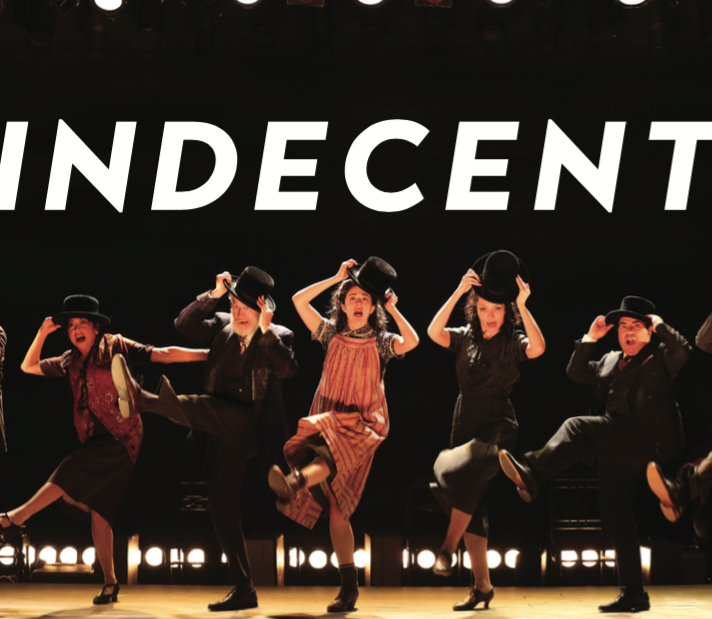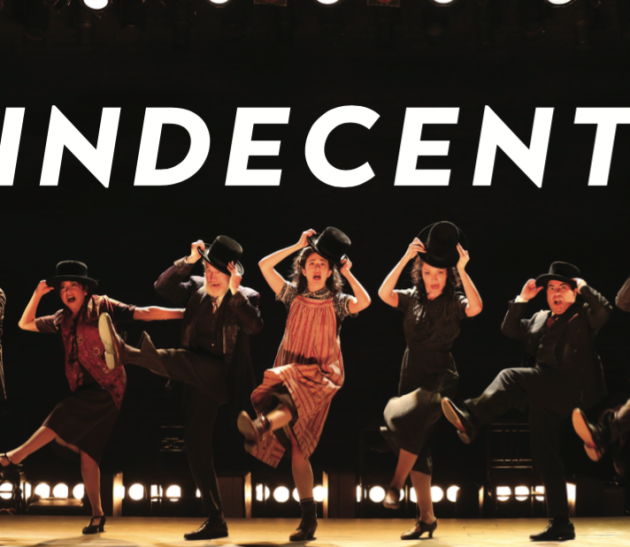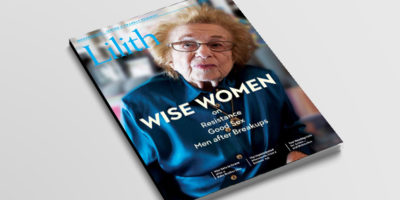
Indecent
 Paula Vogel says that each of her plays talks to a different ancestor. The Pulitzer Prize-winner’s latest play, “Indecent”—which will mark her Broadway debut at age 65—is talking to her Yiddish-speaking grandmother, Frieda, she says in an interview. Frieda came to the U.S. from Moscow when she was five, and was “larger than life, as so many grandmothers are.”
Paula Vogel says that each of her plays talks to a different ancestor. The Pulitzer Prize-winner’s latest play, “Indecent”—which will mark her Broadway debut at age 65—is talking to her Yiddish-speaking grandmother, Frieda, she says in an interview. Frieda came to the U.S. from Moscow when she was five, and was “larger than life, as so many grandmothers are.”
“Indecent” opens on Broadway at the Cort Theatre in April after successful runs at Yale Rep, La Jolla Playhouse and, most recently, at the Vineyard Theatre in downtown New York last year. Vogel co-created the play with director Rebecca Taichman, inspired by Scholem Asch’s historic play “God of Vengeance” and the controversy surrounding its Broadway production. “Indecent” is a play that wraps itself around another play and celebrates, ponders, and probes it, unwrapping something altogether new and provocative.
Asch’s 1907 “Got Fun Nekome,” or “God of Vengeance,” played success- fully through cities in Europe and on the Lower East Side of New York City in the original Yiddish before an English-language translation opened on Broadway in 1923 at the Apollo Theatre on 42nd Street. But, following charges of indecency and obscenity, producer Harry Weinberger, director and actor Rudolph Schildkraut and other members of the cast were arrested and fined. A trial followed. After a conviction, they appealed the decision and it was overturned. The show did go on for about six weeks.
The play, with its title drawn from the opening of the 94th Psalm and set in early 20th-century Eastern Europe, embraced controversy on many levels: Jacob is a traditional Jew with an untraditional profession. He runs a brothel in the space below his home, where he and his wife, a former prostitute, are trying to raise their daughter Rifkele to be a proper young Jewish woman; they hope to find a distinguished bridegroom for her.
For Jacob, the two realms of his life are separate, “like kosher and treyf.” He buys a Torah for their home, as though that will mitigate his sins. Rifkele is a good daughter and, still, she is drawn romantically to Manke, a kind prostitute who works for her father. Their first kiss is startling and consensual. Remarkably, Asch was 26 when he took on themes of hypocrisy, sin and untraditional love. He seemed to understand much about class, the choices women make and the bargains some people strike with God. The play remains, more than a century later, of the moment.
“I think that ‘God of Vengeance’ is telling us a story that we as Americans need to stop and think about,” Vogel says. “The obscenity trial took place at the height of anti-Semitism and the height of anti-immigrant sentiment. In the 1920s, Congress passed laws to stop Eastern European Jewish refugees from coming in. Thousands were sent back. It’s extremely striking in this climate of fear that ‘God of Vengeance’ was deemed obscene.” She adds, “This led to the ultimate obscenity of the Holocaust.”
Taichman says, “I would never have wished that ‘Indecent’ would feel as resonant as it does today. When we began our process, the world was a different place. The play feels more and more (tragically) meaningful every day.”
A play with music,“Indecent” traces “God of Vengeance” from 1906 Warsaw to Bridgeport, Connecticut, in the 1950s. The troupe of seven actors plays more than 40 roles. Planks and suitcases filled with props fill the stage. The musical score, performed live, reflects the era. In one of the first scenes, Asch, the young playwright, visits the Warsaw salon of Yiddish writer and cultural luminary I. L. Peretz, where his new play is read by those assembled. With a nod to Thornton Wilder’s “Our Town,” “Indecent” features the troupe’s stage manager Lemml as a central character, whose qualities are based on Rebecca Taichman’s grandfather.
Aspects of Asch’s biography are woven into “Indecent”: Asch was born into a Hasidic family in Kutno, Poland, the youngest of 10 children, and traditionally educated. When his parents disapproved of his interest in secular subjects, he moved away to study. To support himself, he wrote letters for illiterate people, learning a great deal about human emotions, needs and longings. He read widely, began writing and traveled to Warsaw, where he indeed met with Peretz. His writings were published and plays produced to considerable suc- cess. In 1908, Asch traveled to Palestine, and in 1914 settled in New York. In addition to his literary work, he was involved in public life and he was one of the founders of the American Jewish Joint Distribution Committee. After World War I, he participated in a fact-finding trip to Lithuania, and was very disturbed by what he saw of Jewish life.
Vogel first came across “God of Vengeance” when she was 22, and just coming out as a lesbian. “I was trying to find my way in theater, and a teacher said, ‘This is a play you should read’.” Standing in the library stacks, Vogel read a yellowed 1912 translation.
“To think that in the second act, a love scene between two women was written by a young newly married man, astonished me,” she says. “This was the purest love between two women. Stunning for 1906. It’s a love presented in a sacred light.”
“It’s also about a love for theater and a love of art,” Vogel says.
For Taichman, “The love stories in ‘Indecent’ are much like the ripples that spread from dropping a pebble in the water. There are multiple love stories that entwine and accumulate.”
Taichman had her own “God of Vengeance” moment. While a graduate student at the Yale School of Drama, she came across a mention of the play and the obscenity trial, and was very surprised that she had heard of neither in her theater studies.
“The play moved me very deeply as a work of art,” she says.
She then found transcripts of the trial at the Yale law library, as well as Scholem Asch’s papers and the Harry Weinberger collection, all housed at Yale. She became “obsessed with the play and the history surrounding it,” and for her graduate thesis created a theatrical piece, “The People vs. ‘God of Vengeance’.”
She knew that she was onto something with great potential, and she also knew she wasn’t a playwright. In thinking of collaborating, her first choice was Vogel.
“I was floored when Paula said yes. She was an audacious ask.”
Over seven years, Vogel has written 40 drafts of this play. The playwright, whose previous work includes the Pulitzer award-winning “How I Learned to Drive,” “And Baby Makes Seven” and “The Baltimore Waltz,” recently received her Ph.D. from Cornell. She started the program decades ago and left when her thesis subject was rejected as too feminist—the committee recently invited her back, apologized and granted the degree.
Vogel, whose father was Jewish and mother is not, says that a lot of people ask whether she considers herself Jewish. “Yes, I’m Jewish. If I had been in Europe at that time, I’d have been on a transport train. For that reason I have to celebrate that my grandparents made it into this country and became American,” she says. “I also married into a Jewish family.”
Last December, just as Vogel and Taichman were getting plans underway for “Indecent,” New Yiddish Rep pre- sented “God of Vengeance” at La Mama in lower Manhattan. This was the first revival of the play in more than 70 years, performed in Yiddish with English supertitles. Among the cast members were several actors who had grown up in the Hasidic world and left it; this play was their debut experience on stage. Eleanor Reissa, who directed the play and also played Yankel’s wife, Sarah, said that these cast members “definitely gave a truth and depth to issues of religious hypocrisy and they brought a color to their characters that was very real.” She said they were also helpful in deciphering the religious references in the text. Melissa Weisz, who played Manke, left the Satmar world, where it would be for- bidden and scandalous to act on stage, let alone have a lesbian relationship.
Caraid O’Brien, an actor, playwright and translator who has translated “God of Vengeance” into English and played Hindel, explains why it has been decades since the play was staged: “In 1946, after the war, Asch asked theater companies to stop performing the play because he was afraid it would be misinterpreted or used as anti-Semitic propaganda. In the shadow of the Holocaust, he felt it was not the time to be presenting this play.” There have been many productions in English, with translations by O’Brien, as well as Joseph Landis, Donald Margulies, Joachim Neugroschel and others. It’s a play with voices that linger, in any language.
David Mandelbaum, artistic director and co-founder of New Yiddish Rep, remounted “God of Vengeance” this March for two weeks off-Broadway. Taichman spoke at a talkback after an evening performance, and, in another interesting link between the two productions, Reissa is an understudy in “Indecent.”
Last year, when “Indecent” was about to open at the Vineyard and the cast was in the midst of rehearsals, Passover was approaching, and the team held a seder for the entire cast in the theater lobby. The seder was led by Taichman’s father, with music by Lisa Gutkin of the Klezmatics; cast, staff and spouses danced in circles through the theater. At the end, Vogel toasted to “Next Year in New York.”
Indeed. This year, they’ll celebrate at the Cort.
“The seder taught me something about the play,” Taichman says. “The ritual of a Passover seder is the retelling of a liberation story. The very act of telling the story is a reminder that storytelling is a necessary and vital act—and that looking back into history to understand the present is also essential. The story of ‘Indecent,’ to me, is also a story that needs to be retold and not forgotten. The characters of ‘Indecent’—a group of dead Yiddish theater actors risen to tell our story—are driven by this need.”
“The play is a human story,” she says. “It strives to celebrate the power of making art in dangerous times, and the necessity of love when fear and anger risk taking over.”
Sandee Brawarsky, an award-winning journalist and author, serves as the culture editor of The Jewish Week. Her most recent book is 212 Views of Central Park: Experiencing New York’s Jewel From Every Angle.



